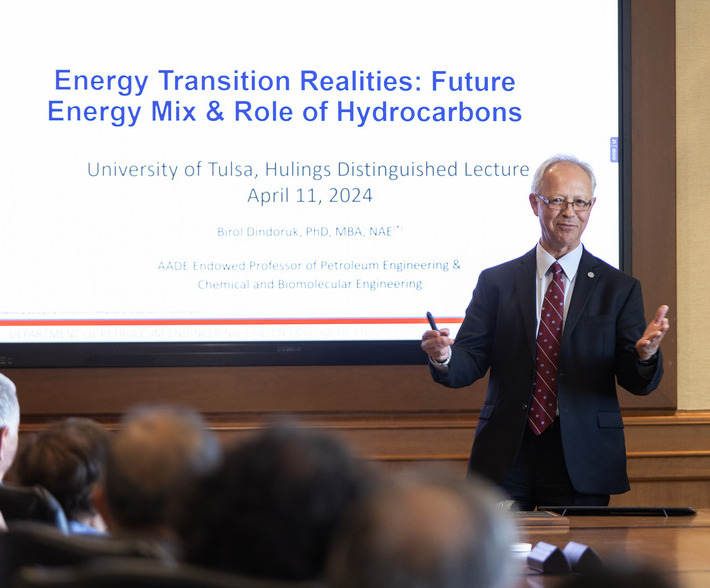
On April 11, The University of Tulsa College of Engineering & Computer Science welcomed guest speaker Dr. Birol Dindoruk for its Hulings Distinguished Lecture Series.
Dindoruk, the American Association of Drilling Engineers Endowed Professor of Petroleum Engineering at the University of Houston, spoke on “Energy Transition: Future Energy Mix & Role of Hydrocarbons,” a topic that resonated well with the mix of faculty, students, and staff.
“Basically, I’m a certified nerd,” Dindoruk said after being introduced by James Sorem Inaugural Dean Andreas A. Polycarpou and Jeffrey J. McDougall Eminent Chair Professor in Petroleum Engineering James P. Brill, who also presented Dindoruk with a commemorative plaque.
Sharing that energy is embedded in every aspect of modern life, Dindoruk says that the role of petroleum engineers is to focus on deployable technologies that are fundamental for key technology problems. He also discussed the “opportunity space,” where complex problems require collaborative approaches.
Dindoruk also touched on the energy challenge, known as 3S, which stands for economic security, environmental security, and energy security.
“One main thing that we have to consider about energy is that it is embedded in every aspect of the modern economy,” he said. The more that goods change hands in a given time, the more wealth that is generated. This is something that cannot be ignored; we cannot make energy very expensive or unaffordable, especially in developing countries.”
Referencing a slide on today’s energy mix, Dindoruk shared that the current breakdown is 31% oil, 21% gas, 29% coal, 10% biomass, 5% nuclear, and 4% renewables, but “these numbers can change from year to year.”
“We have been in energy transition from the beginning ages,” he said. “We are changing over time, and our lifestyles are changing over time. If you look at the behavior part of it, that is an important change.”
 Echoing his earlier comments, Dindoruk said that when it comes to the global carbon budget, our opportunity space is in the subsurface: aquifers, oil reserves, coal reserves, and gas reserves, to name a few.
Echoing his earlier comments, Dindoruk said that when it comes to the global carbon budget, our opportunity space is in the subsurface: aquifers, oil reserves, coal reserves, and gas reserves, to name a few.
“We are – and for the foreseeable future – will be using fossil fuels, and CO2 will be coming out of it,” he said. “This is an opportunity space as a result.”
Dindoruk also shared that hydrocarbons will continue to play a major global role for many years while the non-combustible segment will increase. Infrastructure will dictate the timing of global-scale decarbonization, a method of climate change mitigation that significantly reduces or eliminates CO2 and other greenhouse gas emissions from the atmosphere.
“We are really privileged today to have Dr. Birol Dindoruk as the inaugural speaker for the Norman Hulings Distinguished Lecture Series on engineering and computer science,” said Brill. “He is renowned for his work in phase behavior and enhanced oil recovery and CO2 sequestration, and also exploring the use of data analytics and artificial intelligence in applications in the energy industry.”
Dindoruk, a member of the National Academy of Engineering, currently resides as an AADE Endowed Professor at the University of Houston and is well known for his extensive work on the thermodynamics of phase behavior/EOS development, miscibility assessment and experimental work, the interaction of phase behavior and flow in porous media, enhanced oil recovery, and CO2 sequestration, and correlative methodologies.
During his career, his technical contributions have been acknowledged with many awards, including the SPE Lester C. Uren Award (2014), the Cedric K. Ferguson Medal (1994), and Distinguished Membership.
In 2017, he was elected as a member of the National Academy of Engineering for his significant theoretical and practical contributions to enhanced oil recovery and CO2 sequestration. Dindoruk was the Data Science and Engineering Analytics Technical Director of the SPE and a member of the Advisory Committee of the SPE Reservoir Dynamics and Description Technical Discipline. He has been active in various editorial positions under SPE and also Elsevier. Currently, he is the editor-in-chief of all SPE Journals. Dindoruk is a Director at the Interaction of Phase Behavior and Flow (IPB&F) Consortium at the University of Houston.






